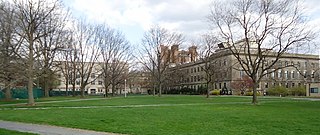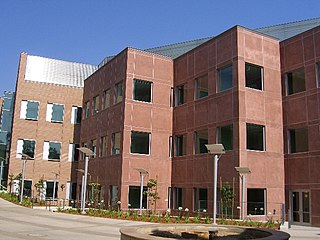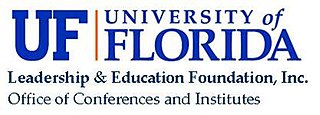
Agricultural science is a broad multidisciplinary field of biology that encompasses the parts of exact, natural, economic and social sciences that are used in the practice and understanding of agriculture. Professionals of the agricultural science are called agricultural scientists or agriculturists.

The New York State College of Agriculture and Life Sciences at Cornell University is a statutory college and one of the four New York State contract colleges on the Cornell University campus in Ithaca, New York. With enrollment of approximately 3,100 undergraduate and 1,000 graduate students, CALS is the third-largest college of its kind in the United States and the second-largest undergraduate college on the Cornell campus.
The University of California, Davis, College of Agricultural and Environmental Sciences was established in 1922 and is one of four colleges on the campus of the University of California, Davis. It offers degrees in twenty-seven undergraduate majors and thirty-three graduate groups. As of January 2014, the College has been overseen by Dean Helene Dillard.

Citrus greening disease is a disease of citrus caused by a vector-transmitted pathogen. The causative agents are motile bacteria, Liberibacter spp. The disease is vectored and transmitted by the Asian citrus psyllid, Diaphorina citri, and the African citrus psyllid, Trioza erytreae, also known as the two-spotted citrus psyllid. It has also been shown to be graft-transmissible. Three different types of HLB are currently known: the heat-tolerant Asian form, and the heat-sensitive African and American forms. The disease was first described in 1929 and first reported in China in 1943. The African variation was first reported in 1947 in South Africa, where it is still widespread. Eventually, it affected the United States, reaching Florida in 2005. Within three years, it had spread to the majority of citrus farms. The rapid increase in this disease has threatened the citrus industry not only in Florida, but the entire US. As of 2009, 33 countries have reported HLB infection in their citrus crop.

The University of Natural Resources and Life Sciences, Vienna, or simply BOKU, founded in 1872, is an education and research centre for renewable resources in Vienna, Austria. BOKU combines expertise in the fields of natural sciences, engineering and biotechnology as well as social and economic sciences. In research and teaching, it focuses on

Assam Agricultural University (AAU) is an agricultural education state university which was established on 1 April 1969 in Jorhat in the state of Assam, India. The jurisdiction of the university extends to the entire State of Assam with regard to teaching, research and extension education in the field of agriculture and allied sciences. The university has a number of campuses with its headquarters at Borbheta, Jorhat.

The University of Florida Institute of Food and Agricultural Sciences (UF/IFAS) is a teaching, research and Extension scientific organization focused on agriculture and natural resources. It is a partnership of federal, state, and county governments that includes an Extension office in each of Florida's 67 counties, 12 off-campus research and education centers, five demonstration units, the University of Florida College of Agricultural and Life Sciences, three 4-H camps, portions of the UF College of Veterinary Medicine, the Florida Sea Grant program, the Emerging Pathogens Institute, the UF Water Institute and the UF Genetics Institute.
The University of California Citrus Experiment Station is the founding unit of the University of California, Riverside campus in Riverside, California, United States. The station contributed greatly to the cultivation of the orange and the overall agriculture industry in California. Established February 14, 1907, the station celebrated its 100th anniversary in 2007.

The College of Natural and Agricultural Sciences (CNAS) at the University of California, Riverside, is a nationally unique academic division in that it combines the physical, biological, mathematical and agricultural disciplines under one organizational umbrella. The college is organized into 13 academic departments: Biochemistry, Biology, Botany and Plant Sciences, Cell Biology and Neuroscience, Chemistry, Earth Sciences, Entomology, Environmental Sciences, Mathematics, Nematology, Physics, Plant Pathology and Microbiology, and Statistics.
Joseph C. Joyce, executive associate vice president for agriculture and natural resources at the University of Florida is a Jacksonville, Florida native. He earned his B.S. and M.S. degrees from the University of Alabama. He received his Ph.D. from the University of Florida in 1982.

Northwest A&F University is a national public research university in Xianyang, Shaanxi, China. The university is funded by the Ministry of Education.
The College of Agriculture and Life Sciences is one of eight colleges at Virginia Tech with a three-part mission of learning, discovery, and engagement and it is one of the best agriculture programs in the nation. It has more than 3,100 undergraduate and graduate students in a dozen academic departments. In 2013, the National Science Foundation ranked Virginia Tech No. 6 in the country for agricultural research expenditures, much of which originated from the College of Agriculture and Life Sciences.

The University of Florida Leadership and Education Foundation, Inc. is a 501(c)(3) non-profit corporation that serves as a Direct Support Organization for the University of Florida. Since its creation in 1992, UFLEF, Inc. has been tasked to further the teaching, research and service missions of the University of Florida specifically as they pertain to agriculture, natural resources and related activities.
North Carolina State University's College of Agriculture and Life Sciences (CALS) is the fourth largest college in the university and one of the largest colleges of its kind in the nation, with nearly 3,400 students pursuing associate, bachelor's, master's and doctoral degrees and 1,300 on-campus and 700 off-campus faculty and staff members.
North American collegiate sustainability programs are institutions of higher education in the United States, Mexico, and Canada that have majors and/or minors dedicated to the subject of sustainability. Sustainability as a major and minor is spreading to more and more colleges as the need for humanity to adopt a more sustainable lifestyle becomes increasingly apparent with the onset of global warming. The majors and minors listed here cover a wide array of sustainability aspects from business to construction to agriculture to simply the study of sustainability itself.
The Colorado State University College of Agricultural Sciences includes five academic departments and offers nine undergraduate majors with many concentration options as well as multiple graduate degree programs. People in the College of Agricultural Sciences lead research and design projects in food production, security, and safety, ecosystem health, landscape design, and human well-being. They also provide extension and participate in engagement in agricultural sciences and landscape architecture.
Karen Koch is a plant biologist in the horticultural science department in the University of Florida. She is a professor in the Plant Molecular and Cellular Biology (PMCB) Program, Horticultural Sciences Department, and Genetics Institute at University of Florida.
The Lilongwe University of Agriculture and Natural Resources (LUANAR) is a university outside Lilongwe, Malawi. It was formed in 2011 by a merger between Bunda College of Agriculture of the University of Malawi and Natural Resources College (NRC).










